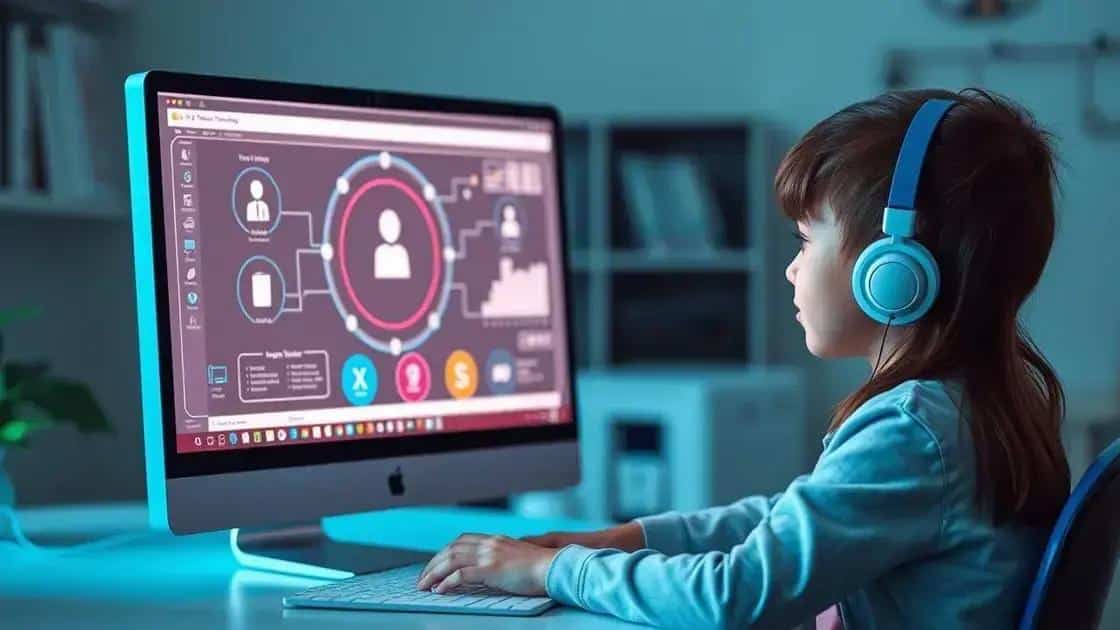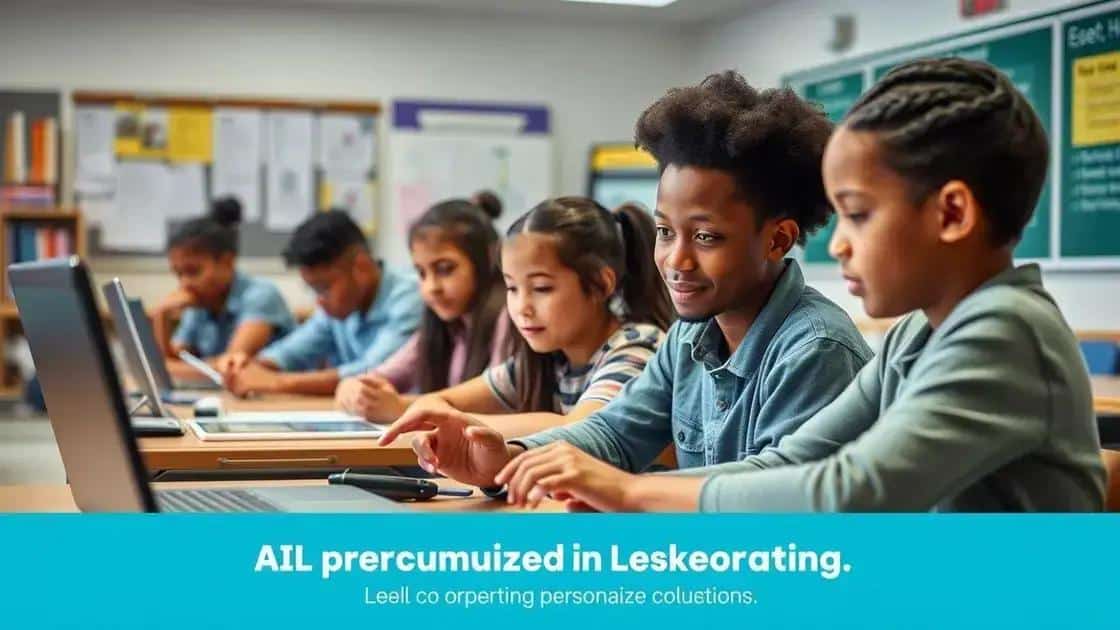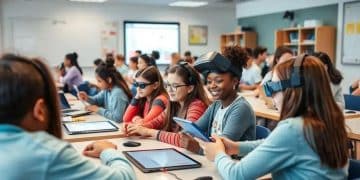Insights on ai tutoring programs for effective learning

AI tutoring programs personalize education by adapting to individual student needs, enhancing engagement, and improving learning outcomes through real-time feedback and data analytics.
Insights on ai tutoring programs show how artificial intelligence is shaping personalized education. Imagine a learning system tailored just for you, adjusting to individual needs and preferences.
Understanding ai tutoring programs
Understanding ai tutoring programs begins with recognizing how they integrate technology into learning. These programs leverage artificial intelligence to tailor the educational experience to each student’s needs. This ensures that learners receive personalized attention and support.
The key features of ai tutoring programs include adapting to individual learning styles and pacing. They analyze the strengths and weaknesses of students and adjust the content accordingly. This makes learning more effective and engaging.
Key Benefits of ai Tutoring Programs
These programs offer numerous advantages in the educational landscape. By utilizing ai tutoring, students can achieve mastery of subjects at their own pace.
- Personalized learning experiences
- Immediate feedback and guidance
- Accessibility to resources anytime, anywhere
- Engagement through interactive content
Another significant aspect is the data-driven approach. AI tutoring systems collect and analyze data about a student’s performance. This information helps educators identify areas needing improvement and tailor future lessons.
Furthermore, ai tutoring programs promote independent learning. Students are encouraged to take charge of their education, developing critical thinking and problem-solving skills. This prepares them for real-world challenges.
Challenges to Consider
While the benefits are clear, there are also challenges with integrating ai tutoring into traditional classrooms. Issues like accessibility and equitable access to technology remain focal points of discussion.
Despite these challenges, the potential of ai tutoring programs cannot be overstated. With the right guidance and implementation, they can transform educational practices and empower students to reach their full potential.
Ultimately, understanding ai tutoring programs opens up new avenues for enhancing education. As these technologies evolve, educators must adapt and leverage them effectively to create inclusive and effective learning environments.
Benefits of using ai in education

The benefits of using ai in education are significant and impact both students and teachers alike. By integrating artificial intelligence into classrooms, educational experiences can be transformed, making them more interactive and effective.
One major advantage is personalized learning. With ai, educational tools can adjust to the individual pace and learning style of each student. This allows learners to process information in ways that work best for them, enhancing their comprehension and retention.
Enhancing Engagement
Another key benefit is the increased engagement among students. Interactive ai tools provide dynamic learning experiences. They often include gamified elements that motivate students to participate actively.
- Interactive quizzes and games promote active learning
- Custom feedback helps students improve
- Access to a variety of learning materials caters to different interests
Additionally, ai in education can help teachers by streamlining administrative tasks. This means they can focus more on teaching and interacting with their students. For example, grading assignments can often be automated, saving time.
Teachers can also use insightful data from ai tools to understand student performance better. This data can highlight areas where students may be struggling, allowing for timely intervention and support.
Inclusivity in Education
Moreover, ai applications can cater to diverse learning needs, promoting inclusivity. Students with disabilities can benefit from specially designed ai tools that provide them with tailored support.
Through speech recognition and text-to-speech services, students can learn in ways that suit them best. This empowers all students to achieve their full potential, regardless of their challenges.
Overall, the benefits of using ai in education are paving the way for a new era of learning that prioritizes personalization, engagement, and inclusivity. Schools and educators embracing these technologies can greatly enhance their instructional practices.
Success stories from schools utilizing ai tutoring
Success stories from schools utilizing ai tutoring demonstrate the powerful impact that technology can have on education. Schools across the globe are witnessing remarkable improvements in student engagement and academic performance.
A great example involves a school district that implemented an ai tutoring program to assist students struggling with math. Real-time feedback and tailored lessons led to a significant increase in test scores. Teachers reported that students became more confident and enthusiastic about learning.
Case Study: Transforming Learning in a Rural School
In a rural school, ai tutoring was introduced to provide additional support to students with limited resources. The program helped bridge learning gaps by offering personalized attention that may not have been possible in a traditional classroom setting.
- Students showed 40% improvement in grades
- Higher participation rates in math and science fairs
- Improved confidence in tackling challenging subjects
This success highlights the adaptability of ai tutoring solutions in various educational environments. Whether in urban or rural settings, the results have been encouraging.
Enhanced Learning Outcomes
Another inspiring story comes from an urban high school that faced challenges with student retention. By integrating ai tutoring programs, the school saw a remarkable change. Students who were once disengaged began to excel, leading to higher graduation rates.
The ai tutoring system provided real-time analytics, allowing educators to identify students needing additional help quickly. This proactive approach positioned teachers to offer support before issues became overwhelming.
As schools continue to share their success stories with ai tutoring, it becomes clear that technology has the potential to transform education. By harnessing the power of artificial intelligence, students receive tailored support that can lead to lifelong learning success.
Future trends in ai tutoring technology

Future trends in ai tutoring technology are shaping the way we think about education. As artificial intelligence continues to evolve, we can expect innovative changes that enhance learning experiences for students.
One critical trend is the rise of adaptive learning platforms. These systems will analyze student performance in real time to adjust the content accordingly. This means tailored lessons that cater to individual learning styles and paces.
Enhanced Personalization
As technology advances, ai tutoring solutions will become increasingly personalized. For example, there will be more focus on emotional intelligence and social interaction, helping to create emotional connections between students and their learning materials.
- Learning paths designed to fit individual goals
- Real-time feedback to guide students
- Integration of virtual tutors that understand student emotions
Another exciting development is the incorporation of virtual and augmented reality. This will allow students to immerse themselves in interactive learning experiences. Imagine exploring the solar system or ancient civilizations through virtual reality while receiving support from ai tutors along the way.
Data Analytics in Education
Data analytics will play a pivotal role in shaping the future of ai tutoring technology. By collecting and analyzing vast amounts of data, schools will provide insights to educators and administrators. This will help monitor student progress effectively and make informed decisions to support learning outcomes.
Additionally, ai tutoring programs will likely promote lifelong learning. As skills continue to evolve in the workforce, continuous education will be crucial. These programs will help learners adapt and grow in a rapidly changing environment.
Collaboration between teachers and ai technologies will also increase. Educators will have access to sophisticated tools that help them customize lessons, track progress, and provide the right support at the right time.
As we look ahead, the future of education with ai tutoring technology is bright. By embracing advancements in artificial intelligence, educators will create personalized, engaging learning experiences for all students. The integration of data analytics, adaptive learning, and immersive technologies will transform how knowledge is delivered. These changes promise to equip learners with essential skills for the future, ensuring they thrive in a rapidly changing world. Together, teachers and ai will pave the way for a more dynamic, inclusive, and effective educational landscape.
FAQ – Frequently Asked Questions about AI Tutoring Programs
How does AI tutoring technology personalize education for students?
AI tutoring technology adapts to each student’s learning pace and style, providing tailored lessons and feedback that improve understanding.
What are the benefits of integrating AI in schools?
Integrating AI in schools enhances student engagement, improves academic performance, and provides teachers with data-driven insights to support their students.
Can AI tutoring programs help students with special needs?
Yes, AI tutoring programs can offer customized support that caters to the unique requirements of students with special needs, promoting inclusivity in education.
What future trends can we expect in AI tutoring technology?
Future trends include increased personalization, the use of virtual and augmented reality for immersive experiences, and enhanced collaboration between teachers and AI.





